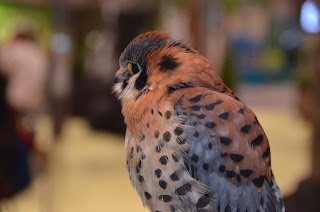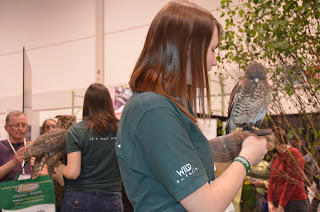Today I went to the Toronto Green Living Show. There were a lot of neat ideas related to conservation ranging from reusable heat pads to a children's card game that was similar to pokemon but with real animals.There was environmentally themed artwork posted in a campaign to stop the Mega Quarry from being developed. A lot of this artwork was very well done and creative.
I initially was quite shocked at the amounts of plastic and waste being created by the free samples at various food vendors. Later I did notice that most of the plastic was recyclable and the spoons were often biodegradable. The most environmentally friendly sample I had was in a small jar that we drank juice from and gave back for them to reuse at other presentations. That little bit of effort that it's going to take to wash those probably saved more waste from going into the environment. Very interesting and good idea. Anyways enough of the environmental impacts and everything because I'd rather not turn this blog into a place for long winded rants.
A group that I am a part of called Wild Ontario is a volunteer organization that takes care of unreleasable injured or imprinted birds of prey and uses them for educational outreach. I attended the Green Living Show with this group and was giving presentations about the birds and talking to people for most of the day. I did however manage to get some time to grab some last photos of these amazing birds before I graduate and leave Guelph and sadly also Wild Ontario. So without further delay here are some amazing creatures:
American kestrels are part of the falcon family. Related to the peregrine falcon they are fast fliers with streamlined bodies. They have many adaptations to being predators of other birds. Their streamlined body and strong angled wings allow them to catch other birds in the air while diving at great speed. They catch the birds with their sharp talons and can kill them quickly with a tomial tooth. However, kestrels aren't restricted to only eating birds. These agile fliers can catch insects such as dragonflies and small mammals.
 |
| Lianne and Apollo (Male American Kestrel) |
American kestrels in these photos might appear quite small but they are in fact fully grown. Most birds do all of their growing within their first summer. They are a migratory species and will need to be fully grown and flying by the time they leave the nest.
 |
| The most colourful bird of prey |
The first bird I ever got trained on at Wild Ontario was Artemis. Artemis is a female American Kestrel. You can tell the difference between male and female kestrels because they are sexually dimorphic (males and females look different) in terms of colour. The males are brighter coloured. Artemis was taken out of the wild illegally. This was reported and she was handed over to Wild Ontario after she was deemed unreleasable by a rehabilitation center in Toronto. When we first got her she had no flight feathers or tail feathers. This is likely because she was kept in a cage that was too small. She wasn't able to fly at all but over time grew her feathers back. Unfortunately she was still too comfortable with humans to return to the wild.
 |
| Artemis (Female American Kestrel) and I |
Helen-Marie is a new member of Wild Ontario and after months of training
she is now holding her first bird. Congrats and welcome!
 |
| Helen-Marie with Apollo, Kerry with Einstein |
 |
| Helen-Marie, Apollo and Jenn |
Socrates is the founding father of Wild Ontario. In 1987, Socrates was one of the many avian patients treated by the
veterinarians at the Ontario Veterinary College’s Wild Bird Clinic. Socrates
had been hit by a car, and had severely broken his left wing. A new type of surgery was performed on Soc in an attempt to fix his broken wing. This involved filling the bone with a substance that would dissolve over time while allowing it to heal over top and eventually leaving the bones hollow. Unfortunately for Soc this procedure was new and wasn't successful on him. However it has been greatly improved and has been successful on other individuals. Since Socrates was injured badly and could not fend for himself in the wild he became part of an education program which expanded after the wild bird clinic closed and is now known as Wild Ontario.
 |
| Jenn and Socrates (Male Turkey Vulture) |
Einstein is an imprinted bird. Unlike Socrates who is physically injured Einsteins mind is the reason why she is unreleasable. After a tree fell down it was reported that there had been an owls nest inside of it. The eggs got taken to a rehab center and were taken care of until they hatched. Owls lay their eggs a day apart and they usually hatch a day apart as well. Einstein hatched first and the vets weren't ready for her so the first thing she saw was a bearded man. This owl now thinks she is a bearded man! Einstein can't go back to the wild because she wouldn't recognize her own species and could kill other owls or hurt people by trying to get food from them. Einsteins story isn't all bad though. Her two younger siblings didn't imprint on anyone and they did get released back into the wild.
 |
| Kerry and Einstein |
 |
| Birds can't sweat so they will pant like dogs when warm |
 |
| Einstein is actually named quite ironicly because most of her head is filled with large cone shaped eyes rather than brain |
 |
| Helen-Marie and Kyle with Einstein |
Whistler is a female Broad-winged Hawk. She was also taken out of the wild illegally. Whis didn't loose the ability to fly in captivity but she did get frostbite. As a migratory species she can't cope well with Canadian winters and the person who had her in captivity did not deal with this issue as well as they could which resulted in Whistler loosing a few talons on her feet.
 |
| Lianne and Whistler (Female Broad-Winged Hawk) |
Whis is quite well named and Broad-winged hawks have a very loud whistling screech.
All of the birds seen above are wild animals that have been deprived of their natural life. Bird of prey are high maintenance, dangerous and do not make good pets. It is illegal to keep a bird of prey without a falconers license. The people in these pictures have been trained to work with these birds. Please keep these birds in the wild where we and future generations can admire them.
For more information about Wild Ontario see the website: http://www.ourwildontario.ca/index.html























No comments:
Post a Comment